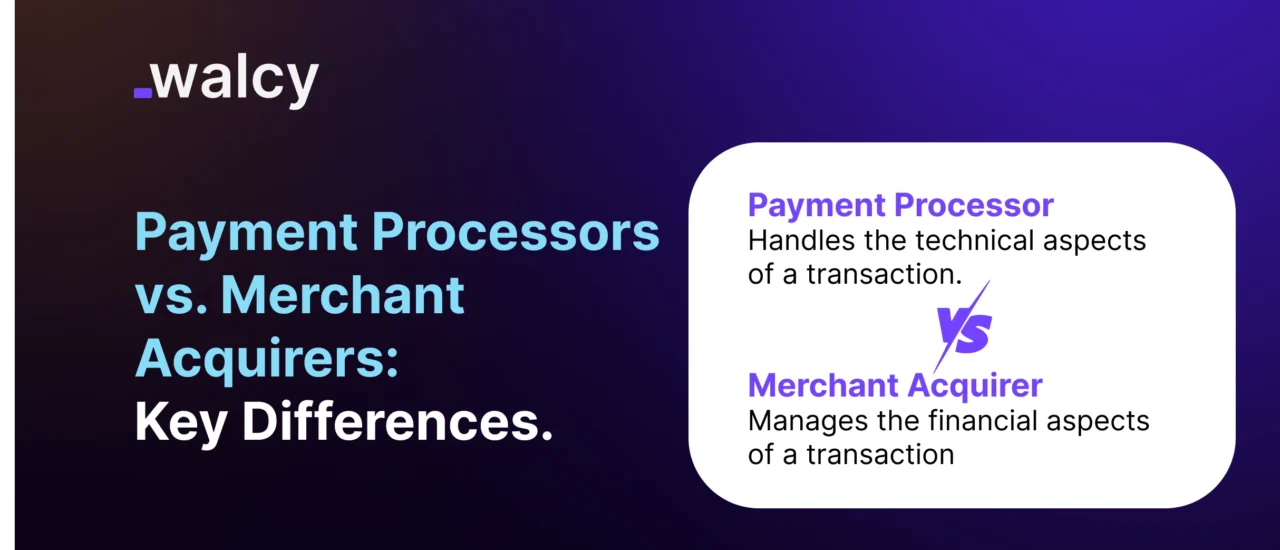In the complexity of e-payment processing, knowledge of the various roles a payment processor and a merchant acquirer play can help a company with optimized transactions while minimizing unnecessary increases in processing costs.
Even though both of these integral parts work in harmony with each other, they hold some very different responsibilities and purposes.
Let’s dive in a bit more into some of the ways “payment processors vs. merchant acquirers” differ in their functions and how they fit into the payment processing process.
What is a Payment Processor?
A payment processor is a company that acts on behalf of a merchant to carry out a transaction involving the usage of a customer’s credit or debit card.
Whenever any customer makes any purchase, the payment processor is responsible for the technical part of sending the data regarding the transaction involved to the concerned parties.
Payment processors verify the identity of transactions, and fraud checks, and protect the security of transferring funds.
Besides offering payment processing, many of these companies can also offer merchants the needed tools and services for many business needs: just about anything from payment gateways and point-of-sale systems to transaction reporting.
That enables businesses to have much easier access to their sales, the ability to analyze all of the data regarding the payments, and an enhancement in customer interaction management.
A payment processor provides all services so that the merchant can give the customer a smooth and secure shopping experience must-have in today’s digital marketplace.
Read more about: How Payment Processing Works? Best Payment Processor.
What is a Merchant Acquirer?
A merchant acquirer, also referred to as an acquiring bank, is a financial institution that deals with the handling of a merchant’s account and allows a business to receive credit and debit card payments.
It assumes responsibility for the settlement of funds into a merchant’s account once a transaction has been approved. Merchant acquirers charge fees for these services, normally including processing costs and interchange fees.
In addition to providing payment processing, merchant acquirers accept a portion of the risk involved with the transaction. They perform due diligence on the merchants they work with and further support fraud detection.
Many merchant acquirers provide additional services, such as chargeback management, customer support, and reporting tools, which for sure may become very important for those businesses seeking to lighten their payment processing load and further enhance their financial health.
Businesses can have all the required infrastructure in this respect with the help of a reliable merchant acquirer.
Read about: What is a Merchant Acquirer? Know Everything About.
Payment Processors Vs. Merchant Acquirers: Key Differences
While both are integral in electronic payment processing, they perform different functions:
The flow of information and the technical aspects that ensure the actual movement of transactions to the relevant networks securely will be handled by the payment processors. They focus on transaction authorization, fraud detection, and the technical infrastructure behind the different payment methods.
The merchant acquirer maintains the merchant’s account, assumes the risk of the transactions, and settles the funds. They establish a relationship with the card networks and are responsible for facilitating the money transfer to a merchant’s account when a transaction occurs.
Being aware of these differences will allow an enterprise to make appropriate choices regarding the selection of service providers that fit their needs and strategies with regard to the processing of vendor payments.
Normally, a payment processor would integrate with several acquirers for smooth transaction processing while the acquirer would be focused on the financial relationship and risk involved.
This collaboration further ensures seamless interaction through the various touchpoints in the payment experience from customer to merchant, creating more trust and satisfaction in the payment process.
Read about: Best Merchant services providers: A Complete Guide.
How Payment Processors and Merchant Acquirers Work Together
These participants interact in the usual course of a payment processing cycle as explained below:
- When the customer initiates the transaction, the details of the card are sent by the payment processor to the acquiring bank. During this step, it involves encrypting the payment data for it not to get intercepted during transmission.
- The merchant acquirer informs the cardholder’s issuing bank about the transaction’s approval or rejection. This is also part of verification: to check that the details regarding the card are appropriate, and secondly, to see that adequate funds are available or credit is up to par.
- After the transaction has been approved, the money is moved by the acquirer to the merchant’s account. They settle the transaction by transferring the approved amount to the merchant’s bank account.
- Throughout the whole process, the payment processor and the merchant acquirer are in constant concern about the fraud possibility and unauthorized transactions. They implement various security systems to send out sensitive information, such as tokenization and encryption.
- In turn, after settlement, the payment processor will normally provide the merchant with a transaction report outlining sales data, fees, and chargebacks. This shall help merchants manage their finances and give an overall assessment of their payment processing performance.
- Ultimately, it is the combination of collaboration by payment processors and merchant acquirers that ensures a seamless and efficient payment experience, so that a merchant may focus on his core business activities with the assurance of security within his customer’s transactions.
Why You Need Both for Smooth Payment Processing
Both the payment processor and merchant acquirer will be involved in the complete processing of the transactions.
While payment processors offer security, real-time authorizing of a transaction, and detection of fraud, the merchant acquirer holds the merchant account and is hence essential in the actual settling of funds.
In addition, both parties simultaneously provide ease of better efficiency in the actualization of the payment procedure. A payment processor automates the technical part of the transaction, so approvals come more quickly and with fewer delays.
Meanwhile, the merchant acquirer assumes financial risk and has the proceeds from the transaction deposited timely in the merchant’s account. This is the synergy that improves customer satisfaction through smooth checkout while at the same time providing valuable insight into analytics about the performance of their sales for the business.
Aggregated, they form a solid foundation on which a business can thrive and become agile in response to an ever-changing digital marketplace.
Choosing Between Integrated Solutions and Standalone Services
Some provide bundled solutions where the payment processor and merchant acquirer come under one service, while others prefer standalone providers, allowing businesses to make better choices for their needs in vendor payment processing.
Your proper selection of a solution depends on transaction volume, needs of security, and budget.
This is where integrated solutions are concerned; businesses may enjoy smoother processes, possibly at a lower aggregate fee, since the services emanate from one source.
This may simplify how the payment systems are managed and reduce the complexity of dealing with multiple providers. However, flexibility and customization may be better achieved through standalone services by allowing businesses to choose providers that are specialized in a manner that aligns with business operation needs far more closely.
In the end, businesses should focus on particular needs, such as transaction types they deal with and growth projections, to identify what will work in the best interests of their payment processing strategy to enhance customer experience.
Key Considerations When Selecting a Payment Processor and Merchant Acquirer
Business people have to make decisions regarding various merchant acquirers and credit processors, and their basis of choice should focus on the following:
Processing fees and set-up costs: Major specific information will involve understanding fee structures for each provider since these can vary significantly. They need to seek clarity in pricing and how the volume of transactions would impact the overall cost.
Security and fraud prevention systems: Ensure the payment processor and merchant acquirer employ state-of-the-art security methodologies, including but not limited to encryption, tokenization, and hosted PCI-DSS compliance, in order to secure sensitive customer information.
Customer service and integration: Analyze the level of customer care each provider supports, their time to tackle situations, and speed and availability. You could also look into how relatively straightforward each of the payment solutions is to integrate with your system and software.
Compatibility with present payment systems: Ascertain that the chosen vendor will be able to manage all types of credit cards, including digital wallets and new forms of paying for goods and services. Compatibility across different kinds of platforms will be a plus in driving convenience to customers.
Reputation and reliability: Research the reputation of the potential providers by reading customer testimonials and case studies. A trusted payment processor and merchant acquirer would have a previous history of successful transactions and with times of minimal shutdowns.
Flexibility and scalability: You have to choose providers who will be able to adapt to every change in your business. While your business is growing, it should be able to scale with a payment solution, when the volumes increase alongside new methods of payments being brought into play.
Conclusion
Differentiating the roles also makes both the payment processor and merchant acquirer individually important to enterprises in the world of electronic payment processing.
A proper understanding of their respective roles will ease enterprise decisions on which combination or integrated solution to use in performing transactions efficiently and securely.
This can only lead to increased reliability in transactions, coupled with satisfaction in customers, impacting overall business success.
Moreover, if corporations go through the provided features, costs, and support options of each provider, they will be able to optimize their payment strategies and move along with market evolution.
As the digital payment landscape continues to grow, it will only be possible to stay competitive by being informed and choosing the right partners.
The synergy between payment processors and merchant acquirers is what will empower corporations to be competitive in a world moving toward being cashless.
Read about: All About Overseas Payments (2024); Comprehensive Guide
Do follow us on Facebook and LinkedIn, to stay connected with us.



